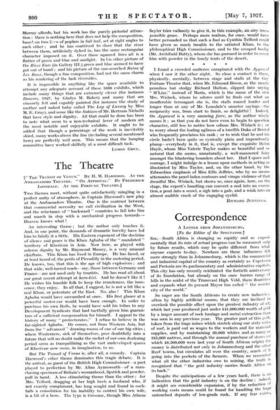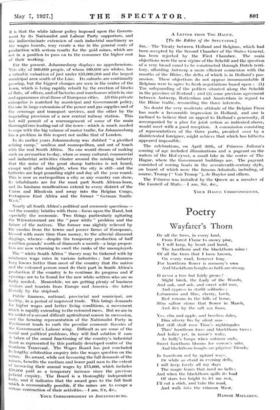Correspondence
A LETTER FROM JOILANNESBURG.
[To the Editor of the SPECTATOR.] SIR,—South Africa is changing so rapidly and so experi- mentally that its rate of actual progress can be measured only by future results, which may be quite different from what anyone expects to-day. Nowhere are these influences felt more strongly than in Johannesburg, which is the commercial and industrial capital of the country as certainly as Capetown and Pretoria are its parliamentary and administrative capitals. This city has only recently celebrated the fortieth anniversary of its foundation, but already on the once barren range of hills in the midst of the Transvaal High Veld, there flourishes and expands what its present Mayor has called the wonder city of the world."
So eager are the South Africans to create new industries, often by highly artificial means, that they are inclined to overlook the possible effect upon the greatest industry of all, which last year produced just under £41,000,000 worth of gold by a larger amount of rock haulage and metal extraction than was seen in any previous year. The greater part of this gold, taken from the huge mines which stretch along our sixty miles of reef, is paid out as wages to the workers and for material supplies, and by maintaining 20,000 whites and as many as 185,000 natives, and through the annual purchase of stores (of which £8,500,000 were last year of South African origin) the money is distributed not only in Johannesburg and the other Reef towns, but circulates all over the country, much of it going into the pockets of the farmers. When we remember what all the other industries owe to mining, the truth is recognized that " the gold industry carries South Africa on its back."
Despite the anticipations of a few years back, there is no indication that the gold industry is on the decline ; indeed, it might see considerable expansion, if by the reduction Of working costs means could be found for handling the huge untouched deposits of low-grade rock. If any fear exists,
it is that the white labour policy imposed upon the Govern- ment by its Nationalist and Labour Party supporters, and the indiscriminate extension of such industrial machinery as the wages boards, may create a rise in the general costs of production with serious results for the gold mines, which are not in a position to pass on to the consumer the higher cost of their working.
For the present, Johannesburg displays no apprehensions. This city of 300,000 people, of whom 160,000 are whites, has a rateable valuation of just under £53,000,000 and the largest municipal area south of the Line. Its suburbs are continually growing, but the biggest changes are seen in the centre of the town, which is being rapidly rebuilt by the erection of blocks of flats, of offices, and of factories and warehouses which in size and appearance rival those of European cities. All this private enterprise is matched by municipal and Government policy, the one in large extensions of the power and gas supplies and of the sewerage and transport services, and the other by the impending provision of a new central railway station. This last will permit of a rearrangement of some of the main thoroughfares leading out of the town—which is much needed to cope with the big volume of motor traffic, for Johannesburg has a problem in this respect not unlike that of London.
In its earlier years Johannesburg was dubbed " a glorified mining camp," soulless and cosmopolitan, and out of touch with the real South Africa. No one would dream of making such an accusation to-day, when so many cultural, commercial and industrial activities cluster around the mining industry that the noise of the great stamp batteries is not heard, except well after midnight, when the city is still—and the batteries are kept pounding night and day all the year round. This is now as metropolitan a city as any country can show, Its inhabitants are for the most part South African-born, and its business ramifications extend to every district of the Union and Rhodesia and away into the Belgian Congo, Portuguese East Africa and the former " German South- West."
Nearly all South Africa's political and economic questions— and the country bristles with them—focus upon the Rand, but especially the economic. Two things particularly agitating the Witwatersrand are the " poor white " problem and the future of the natives. The former was slightly relieved by the exodus from the towns and poorer farms of Europeans, blessed with more time than money, to the alluvial diamond diggings, whence—despite the temporary production of half a million pounds' worth of diamonds a month—a large propor- tion are now returning to swell the ranks of the unemployed.
The " white South Africa " theory may be tinkered with by minimum wage rates in various industries ; but Johannes.. burg knows better than most of the country that the native and the coloured person must do their part in South Africa's production if the country is to continue its progress and if openings are to be found for the new white settlers who arc so badly needed. Meanwhile, we are getting plenty of business visitors and tourists from Europe and America—the latter literally by the shipload.
Public finances, national, provincial and municipal, arc healthy, in a period of improved trade. This brings demands for higher wages and better living conditions, a movement which is rapidly extending to the coloured races. But we are in the midst of a second difficult agricultural season in succession, and the farming representation of the Nationalist Party in Parliament tends to curb the peculiar economic theories of the Government's Labour wing. Difficult as are some of the social and political problems, they will find solution if care is taken of the sound functioning of the country's industrial heart as represented by this partially developed centre of the Southern Transvaal. The Wages Board has just concluded its lengthy arbitration enquiry into the wages question on the mines. Its award, while not favouring the full demands of the miners, benefits the medium and lower paid men to the extent Of increasing their annual wages by £75,000, which includes i0,000 paid as a temporary increase since the previous ludieial enquiry.. The Board is a thoroughly independent body, and it indicates that the award goes to the full limit which is economically possible, if the mines are to escape a serious contraction of theiractivities.—I am, Sr, &c.,
YOUR CORRESPONDENT IN JOHANNESBURG.















































 Previous page
Previous page